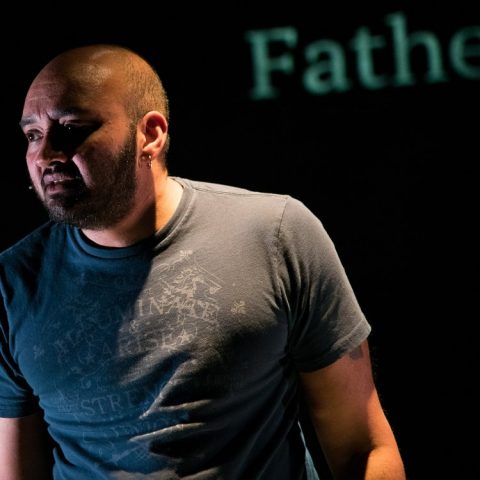

Mashuq Mushtaq Deen makes his New York debut at the Rattlestick Playwrights Theater with Draw the Circle. This hilarious and moving story of his transition is told entirely from the point of view of Deen’s family and friends, as portrayed by Deen, bringing to life the often-ignored struggle that a family goes through when their child transitions from one gender to another. Draw the Circle is directed by Chay Yew and runs on a limited engagement until February 18. I asked Deen some questions about the development of autobiographical work and why the world needs art right now. Here are his responses.
Can you tell us a little more about the origin of this work? When did you decide to write it? Was there one moment or several leading up to that decision?
My friend and mentor, Laura Maria Censabella, said I had to write this play about my transition. This was back in 2007, there wasn’t much out there. My first reaction was, I don’t want to. Because I was scared. And if Laura taught me anything, it was to move towards what scares me.
I tinkered with the idea for a few years, and began working on in earnest when I joined the 2009 Emerging Writers Group at the Public Theater. The play had its first public reading there in the spring of 2010.
Can you tell us a little more about the decision to take yourself out and to tell this story from the point of view of those affected by your transition?
Not exactly. Deen was not a character in early drafts — then briefly he was — then he wasn’t — and that’s where I landed. There are a few reasons Deen does not speak in the play: First, I had already lived through it, and to write a play about the same thing felt redundant. I was much more interested in exploring the journeys of the other characters, there was room to discover, which is an important part of the writing process for me. Second, when researching solo plays I had seen a remarkable play, The Amish Project, by Jessica Dickey. She played all the characters around this one Amish community, and in doing so, the audience was given a much more nuanced portrait of them. It’s like a painting that uses negative space to draw the picture. I wanted to use that same structure, but for an autobiographical story. And lastly, I am not a fan of self-serving plays. By not allowing myself to speak as a character, I took away my ability to defend myself.
We spend too much time defending ourselves. If I stand here naked before you — what’s there to defend?
I’m interested in the process of writing about and then performing real people who are in your life? How do you approach that challenge?
I do my best to be as honest as I can, and to get out of the way. Regardless of whether my characters are “real” or not, it is my job to be truthful to who they are. I don’t construct characters, I listen to them, I follow them.
Draw the Circle is a work of art and activism. How do you see that relationship?
I’m not sure I see the two as separate. I want to leave this world better than how I found it. I use what talents I have towards that end.
I think art has the power to crack something open in us — our hearts grow these shells around them, and if we can devastate*, we can crack those shells a little bit. And then something oozes out, and we realize our hearts were bigger than we realized, and we are, for a moment, healed. And then we do it again. And I guess when I look at the world, I think we need more tender hearts, more cracks in the shells, more kindness.
I’m not here to lecture anyone on how to be a better citizen. I’m here to show you my heart, and maybe your own. This play touches on transgender issues, on immigrant issues, but it is also a very human story about parents and children. As I grow older, I am much more interested in what we have in common — how we are all so desperately human — than I am in the ways in which we are different. I don’t want to say, Look at me! I want to say, Look at us!
*This is reference to a Rumi poem: "The way of love is not a subtle argument. The door there is devastation. Birds make great sky circles of their freedom. How do they learn it? They fall, and in falling, they're given wings." (Jalaluddin Rumi)
I saw the performance on January 31 and stayed for the talk back. I was struck by how many people said out loud “love” and “family.” In the current political climate - how do you think about these words? And what role does theatre and culture play, when we think about love and family?
I think family is where we practice love. To know someone, to know their strengths and faults, and to still love them dearly for who they are (even if they drive us up the wall). And if we can practice this enough, if we can know that we are all flawed, that we are all trying in some fashion, and that we are all worthy of love... can we not take that practice out into the world? Can we not look at a stranger and see them as a complex human being who is worthy of being wrestled with and cared for?